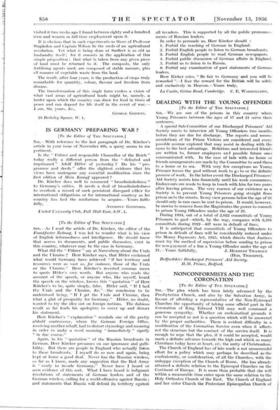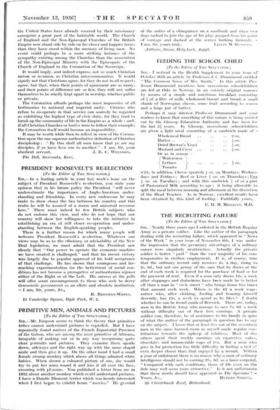NONCONFORMISTS AND THE CORONATION
[To the Editor of THE SPECTATOR.] Sin,—The plea which has been lately advanced by the Presbyterian Church, and also by the Salvation Army, in favour of affording a representative of the Non-Episcopal Churches the opportunity of taking some official part in the Coronation of King Edward VIII may well command a generous sympathy. Whether on ecclesiastical grounds it can be accepted or not is a question which will be answered by the proper authorities. There is evident difficulty in a modification of the Coronation Service even when it affects not the structure but the conduct of the service itself. It is enough to' urge that the plea, if it could be accepted; would mark a definite advance towards the high end which so many Christians today have at heart, viz. the unity of Christendom.
The Church of England has of late made a not unsuccessful effort for a policy which may perhaps be described as the confraternity, or confederation, of all the Churches, with the unhappy exception of the Church of Rome. She has already attained a definite relation to the Episcopal Churches on the Continent of Europe. It is more than probable that she will within a measurable time enter upon the same relation to the Holy Orthodox Church of the East. The Church of England and her sister Church the Protestant Episcopalian Church of the United States have already covered. by their. missionary enterprise a great part of the habitable world. The Church of England and the .Non-Episcopal Churches of the British Empire now stand side by side on far closer and happier terms. than they have stood within the memory of living men. No event could perhaps be a more striking instance of the sympathy existing among the Churches than the association of the Non-Episcopal Ministry with the Episcopate of the Church of England in the Coronation of the Sovereign.
It would imply, and indeed express, not so much Christian union; or re-union, as Christian inter-communion. It would signify not that Christians agree, for they do not in all respects agree, but that, when their points of agreement are so many, and their points of difference are so few, they will not suffer themselves to be wholly kept apart in worship, whether public or private.
The Coronation affords perhaps the most impressive of all testimonies to national and imperial unity. Citizens who refuse to co-operate in that service can scarcely be regarded as exhibiting the highest type of civic duty, for they tend to break up the community of life in the Empire as a whole ; and, if all Christian Churches or bodies were to follow their example, the Coronation itself would become an impossibility.
It may be worth while then to reflect in view of the Corona- tion upon the one supreme authoritative definition of Christian discipleship " By this shall all men know that ye are my disciples, if ye have love one to another."—I am, Sir, your















































 Previous page
Previous page